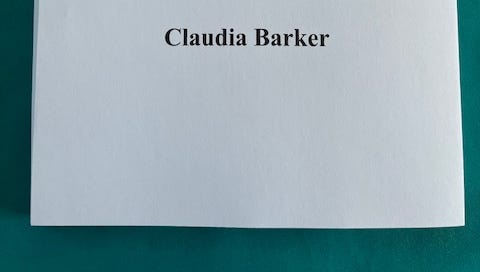Finishing a book is like birthing a baby. I’ve done two of both now and I’d take natural childbirth and its aftermath over marketing a memoir any day. At least with baby making you get a sweet little human to hold and adore. Yes, you have to nurture it, but essentially the product is finished, at least until they become teenagers.
But when you put that final period at the end of the last sentence of the last paragraph of the last chapter of your book, after much feedback from trusted readers and years of rewrites and revisions, you find yourself at the bottom of a big, big hill, maybe even a small mountain, holding about 300 pages in your trembling hands, looking up.
High up on the summit is a published book, your book, with cover art, acknowledgements, your picture on the back flap, and a marketing plan. But between where you are now and that finished product there is much work to be done. And it’s not as much fun as writing.
Don’t get me wrong, there are all sorts of tools to help connect you and your book to the right publisher, and the right agent to get to that publisher. There’s an online resource called Publisher’s Marketplace that allows you to search for agents by book genre. There’s QueryTracker, another service with an agent option in its search engine. And so you type “memoir” in the genre box and get a few hundred agents who list memoir as something they sell. There doesn’t seem to be a way to narrow that field though–no way to differentiate between agents who get excited about someone’s memoir of playing major league baseball and someone trying to educate readers about their experience with a sexual predator. And I can imagine those are two very different kinds of agents.
So you use Publisher’s Marketplace to see the “deals” an agent has made, you look for memoirs that go beyond telling a personal story to those that aim to highlight a larger social issue–in the case of my book, the prevalence of sexual predators in schools, and how those criminals groom and entrap vulnerable young people.
“It’s love!” the starry-eyed fifteen-year-old says. No, honey, it’s rape. Really. You will be processing it for decades. And probably feeling guilty about it. Until you realize that what happened to you was a crime, even if you believed you could consent. You could not.
So how do you hook an agent on your story? You labor over your query letter template–keep it under 350 words, include a compelling “logline,” a one-sentence summary of your book that highlights the central conflict. You start compiling a list of agents that sell memoirs, especially ones by non-celebrities, in a spreadsheet. You visit each agent’s website and the wishlist in each agent’s bio of the types of books they are looking for.
If there’s a picture of the agent you stare deeply into their eyes to see if you think they would get excited about your story, excited enough to use their connections in the publishing industry and advocate for it to an editor. If they look friendly, or they seem like someone who would not discount a book by someone over 60 (think gray-haired female agents), you take the query letter that you have labored over for months and you personalize the first paragraph. Dear [Agent Name], I’m querying you because of your interest in personal stories that address larger social issues. Or, I loved [Author’s Name’s] memoir that you sold, or I see that you love stories that pack an emotional punch, and dogs, as you mention your corgis in the blurb on your website and I am a dog lover too.
You get the idea.
And then you create a file for each agent that includes your query letter and the ten pages, or twenty pages, or synopsis, or book proposal, or all of the above, to be cut and pasted into the body of an email–no attachments! Then you hit send with the index finger of your trembling, and now somewhat weary, hand.
And then you wait.
If you’re super lucky you hear back within a month. If you’re somewhat lucky you get any response at all.
Of the 50 agents I’ve queried in the past two months, ten have declined and one has requested the full manuscript. Of the ten “no thank-yous,” four referred specifically to my story (acknowledging how “vulnerable” or “personal” it is) indicating they, or their assistant, had actually read what I submitted. Four of the ten mentioned how difficult it is to sell memoir unless you are famous or have a “large platform.” Four or five expressed confidence that I would find the right agent and offered encouragement.
Did I mention that I’ve created two websites in order to help sell this book? One is an author’s website, which every writer should have, as it makes for a nice archive of one’s own work that’s searchable and accessible. The other is a website called minorscantconsent.com, which tells a short version of the story that comprises my memoir, provides links to news stories about other sexual predators who have been held accountable, lists resources for survivors, and perhaps most important, invites survivors to submit their own stories for inclusion in what I hope will be a growing archive of testimonials.
I then went kicking and screaming into the world of social media, working with a talented young consultant who is helping me post essays and survivor stories on Facebook and Instagram, to drive traffic (how ‘bout that hip phrase, huh?) to my websites.
All of this is because I am determined to educate people about what grooming looks like so they can spot it and stop abuse before it happens, and to convince survivors of sexual abuse that what happened to them was not their fault and demonstrate that there is liberation in telling your story, even later in life.
Surely there is a literary agent out there who is a survivor and with whom this story will resonate? The CDC estimates that one in four girls and one in 40 boys are sexually abused before the age of 18. May the universe, or the search engines, help me find them.
Meanwhile, I think back to birthing my actual babies, marveling at their toddler antics, attending their parent-teacher conferences, paying for their college educations, and watching them choose mates and careers. I hope one day I can be as proud of this finished book as I am of them. The summit looks a little closer now.







Go Claudia! I hope the universe, or the algorithms, will deliver that perfect agent to you. She'd be lucky to have you as a client--your brave story is so necessary.
Thanks for sharing your experiences, Claudia. I think you will help many find clarity!